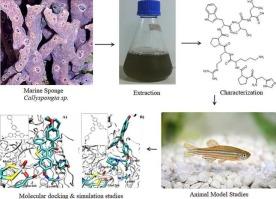Revealing the neuroprotection efficacy of marine sponge extract in Parkinson's disease using gene expression and molecular docking
IF 0.9
Q4 GENETICS & HEREDITY
引用次数: 0
Abstract
Parkinson's disease (PD) is one of the most prevalent neurological conditions. The pathogenesis of PD was thought to involve mitochondrial dysfunction and oxidative stress. In this study, PD was induced in zebrafish models, and the effectiveness of MS01 sponge extract in neuroprotective effects was assessed. In zebrafish models, rotenone was treated, MS01-mixed pellets were fed, sensitivity and motor function were tested, and the fish were euthanized. Histopathology and fluorescent microscopy images of the zebrafish brain were then analyzed. Gene expression study was performed to analyze the expression of the PINK1 and Parkin genes. The compound xenin identified by LC-MS/MS analysis was selected for in silico studies. Using molecular docking and modeling techniques, the gene expression of PINK1 and Parkin was also investigated. The analysis showed binding of the xenin peptide to the PINK1-ubiquitin complex may enhance the stability of the complex and increase the production of parkin, which reduces PD symptoms. This demonstrates the neuroprotective effects of the xenin peptide.

利用基因表达和分子对接揭示海绵提取物对帕金森病的神经保护作用
帕金森病(PD)是最常见的神经系统疾病之一。PD的发病机制被认为与线粒体功能障碍和氧化应激有关。本研究采用斑马鱼PD模型,评价MS01海绵提取物对神经保护作用的有效性。在斑马鱼模型中,给予鱼藤酮处理,喂食ms01 -混合颗粒,测试鱼的敏感性和运动功能,并对鱼实施安乐死。然后对斑马鱼大脑的组织病理学和荧光显微镜图像进行分析。基因表达研究分析PINK1和Parkin基因的表达情况。选择经LC-MS/MS分析鉴定的化合物xenin进行硅片研究。利用分子对接和建模技术,研究了PINK1和Parkin的基因表达。分析表明,xenin肽与PINK1-ubiquitin复合物结合可以增强复合物的稳定性,增加parkin的产生,从而减轻PD症状。这证明了xenin肽的神经保护作用。
本文章由计算机程序翻译,如有差异,请以英文原文为准。
求助全文
约1分钟内获得全文
求助全文
来源期刊

Gene Reports
Biochemistry, Genetics and Molecular Biology-Genetics
CiteScore
3.30
自引率
7.70%
发文量
246
审稿时长
49 days
期刊介绍:
Gene Reports publishes papers that focus on the regulation, expression, function and evolution of genes in all biological contexts, including all prokaryotic and eukaryotic organisms, as well as viruses. Gene Reports strives to be a very diverse journal and topics in all fields will be considered for publication. Although not limited to the following, some general topics include: DNA Organization, Replication & Evolution -Focus on genomic DNA (chromosomal organization, comparative genomics, DNA replication, DNA repair, mobile DNA, mitochondrial DNA, chloroplast DNA). Expression & Function - Focus on functional RNAs (microRNAs, tRNAs, rRNAs, mRNA splicing, alternative polyadenylation) Regulation - Focus on processes that mediate gene-read out (epigenetics, chromatin, histone code, transcription, translation, protein degradation). Cell Signaling - Focus on mechanisms that control information flow into the nucleus to control gene expression (kinase and phosphatase pathways controlled by extra-cellular ligands, Wnt, Notch, TGFbeta/BMPs, FGFs, IGFs etc.) Profiling of gene expression and genetic variation - Focus on high throughput approaches (e.g., DeepSeq, ChIP-Seq, Affymetrix microarrays, proteomics) that define gene regulatory circuitry, molecular pathways and protein/protein networks. Genetics - Focus on development in model organisms (e.g., mouse, frog, fruit fly, worm), human genetic variation, population genetics, as well as agricultural and veterinary genetics. Molecular Pathology & Regenerative Medicine - Focus on the deregulation of molecular processes in human diseases and mechanisms supporting regeneration of tissues through pluripotent or multipotent stem cells.
 求助内容:
求助内容: 应助结果提醒方式:
应助结果提醒方式:


